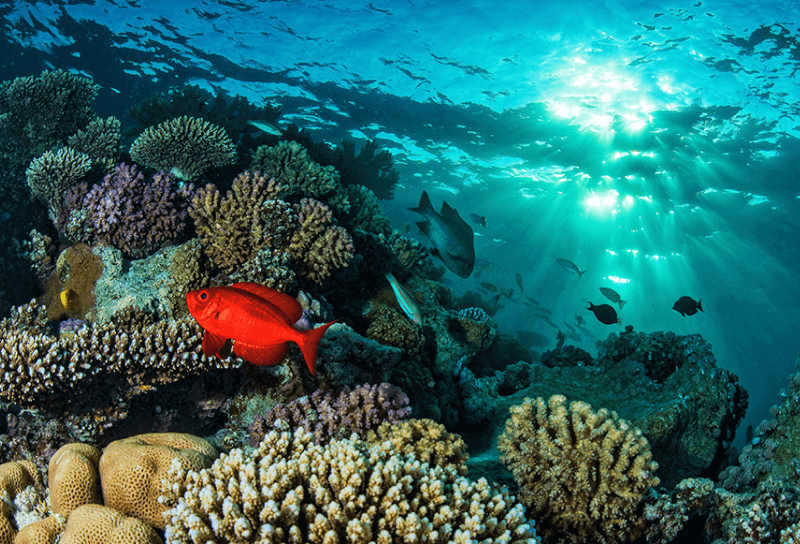
Custodian agency responsible for tracking key SDG 14 indicators on ocean acidification (14.3.1) and scientific collaboration (14.a.1), UNESCO’s Intergovernmental Oceanographic Commission called on governments and stakeholders to boost knowledge generation to fill action gaps on the road to 2030.
Themed around “Building back better from the coronavirus disease (COVID-19) while advancing the full implementation of the 2030 Agenda for Sustainable Development”, and under the auspices of the United Nations Economic and Social Council (ECOSOC), the 2022 High Level Political Forum (HLPF) is taking place on 5-15 July at the UN Headquarters in New York, as a high-level dialogue and review of Member States’ progress in achieving aspects of the 2030 Agenda for Sustainable Development related to education, gender equality, and ocean conservation.
The 2022 HLPF is reviewing specifically progress on achieving the Sustainable Development Goals 4 (quality education), 5 (gender equality) and 14 (life below water), with a strong showing of the international ocean community fresh off the 2022 UN Ocean Conference, which took place in Lisbon from 27 June to 1 July, and yielded an important call to action for accelerating the pace of action for a healthier ocean via the Lisbon Declaration.
The Ocean Decade: Mobilizing knowledge to deliver on SDG 14
Vladimir Ryabinin, IOC-UNESCO Executive Secretary, took part in the official HLPF debate on SDG 14, entitled “SDGs in focus: SDG 14 and interlinkages with other SDGs – Life below water”, which opened with an inspiring intervention by renowned explorer and scientist Sylvia Earle. Mr Ryabinin called on UN Member States and the various stakeholders taking part in the Forum to build on the momentum of the Lisbon Conference, particularly through even greater engagement and mobilization around the UN Decade of Ocean Science for Sustainable Development 2021-2030.
Led by IOC-UNESCO on behalf of the United Nations System, the Ocean Decade is a global initiative to transform how diverse stakeholders cooperate to generate, finance, and use ocean knowledge to develop and implement solutions for sustainable development. The Decade also sets up a multidisciplinary framework to boost cooperation, interlinkages and synergies between SDG 14 and the ocean aspects across all other global goals.
To inform the 2022 HLPF, IOC-UNESCO published a concise policy brief detailing the Ocean Decade’s contribution to delivering on the SDGs. The publication, entitled “The contribution of the UN Decade of Ocean Science for Sustainable Development to the Achievement of the 2030 Agenda”, describes the important role of the ocean in achieving the 2030 Agenda, the transversal nature of SDG 14, and how the Ocean Decade provides the global framework to generate and use the knowledge required for sustainable ocean management and therefore a sustainable planet for future generations.
Access the SDG Policy Brief here
Monitoring SDG 14 progress: UNESCO Side Event
On 6 July, the day before the official debate with experts on SDG 14 progress, UNESCO convened a side event to give a detailed progress report on the various aspects of scientific cooperation and ocean health for which IOC-UNESCO is responsible to monitor as custodian agency of indicators 14.3.1 (ocean acidification) and 14.a.1 (scientific cooperation).
Entitled “Leveraging ocean science and innovation for healthy and resilient coastal and marine ecosystems”, the side event identified the various linkages between SDGs 14, 13 and 15, through two multi-stakeholder panels representing ongoing efforts to finance and build partnerships around ocean research and observations.
Watch the side event here | Access the presentations
Fit-for-purpose ocean data products and services can empower decision-makers, industry and local communities to conserve and restore ocean ecosystems, address vulnerability and build resilience to climate change. Filling the information and data gaps is crucial to enabling and scaling up action to fully implement SDG 14.
The UNESCO Side Event provided a broad overview of key progress, challenges and opportunities to timely address the ocean acidification and marine scientific capacity targets under IOC-UNESCO’s custodianship.
The key message was clear throughout all presentations: the moment is now to build on the transformative work of UN Ocean Decade innovation in ocean observation, technologies and information delivery to support sustainable use and ocean conservation while empowering local communities to build resilience and protect biodiversity through partnerships in nature-based solutions such as the biosphere reserves and blue carbon approaches.
Many of the results highlighted during the side events are also highlighted in the 2022 edition of the UN Secretary-General’s SDG Report, which includes an in-depth focus on the data compiled by IOC-UNESCO and partner networks to track progress on ocean acidification, enshrined in SDG 14 Target 14.3.
***
About the IOC-UNESCO:
The Intergovernmental Oceanographic Commission of UNESCO (IOC-UNESCO) promotes international cooperation in marine sciences to improve management of the ocean, coasts and marine resources. The IOC enables its 150 Member States to work together by coordinating programmes in capacity development, ocean observations and services, ocean science and tsunami warning. The work of the IOC contributes to the mission of UNESCO to promote the advancement of science and its applications to develop knowledge and capacity, key to economic and social progress, the basis of peace and sustainable development.
About the Ocean Decade:
Proclaimed in 2017 by the United Nations General Assembly, the UN Decade of Ocean Science for Sustainable Development (2021-2030) (‘the Ocean Decade’) seeks to stimulate ocean science and knowledge generation to reverse the decline of the state of the ocean system and catalyse new opportunities for sustainable development of this massive marine ecosystem. The vision of the Ocean Decade is ‘the science we need for the ocean we want’. The Ocean Decade provides a convening framework for scientists and stakeholders from diverse sectors to develop the scientific knowledge and the partnerships needed to accelerate and harness advances in ocean science to achieve a better understanding of the ocean system, and deliver science-based solutions to achieve the 2030 Agenda. The UN General Assembly mandated UNESCO’s Intergovernmental Oceanographic Commission (IOC) to coordinate the preparations and implementation of the Decade.